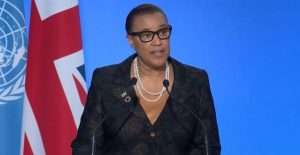The COP29 climate talks in Azerbaijan’s Baku is the world’s only chance to bridge the gaps in climate action and finance which is crucial to “rebuild trust” among countries and protect lives and livelihoods, Commonwealth Secretary-General, Patricia Scotland, has said.

In an interview with PTI via Zoom, Scotland said it is important to have the fossil-fuel producers as allies in the fight against climate change.
“We are nearing the cliff, the critical 1.5 degrees Celsius limit. In fact, some of our scientists say that we are there now. Our home, our planet, is literally on fire. Instead of action, we see the gaps in emissions, finance, and justice widening. It is our duty to bridge those gaps, and COP is our only chance. It comes at a moment of immeasurable urgency,” Scotland said.
She said rich countries promised to provide $100 billion (one billion =100 crore) in 2009. It’s only a drop in the ocean but “we still haven’t got it”.
Rich countries, historically responsible for the climate crisis, in 2009 pledged to mobilise $100 billion per year by 2020 to help developing countries address climate change. However, this target has not been fully met, with much of the financial aid provided as loans at market rates, increasing the debt burden on poor and vulnerable countries. These nations now require trillions to effectively combat the climate crisis.
According to the UNFCCC’s Standing Committee on Finance, $5.8 trillion to $11.5 trillion is required by 2030 to meet the targets set by developing countries in their national climate plans (Nationally Determined Contributions or NDCs).
The 2023 UN Adaptation Gap Report estimated adaptation costs in developing countries to be 10 to 18 times greater than current international adaptation finance flows, which are $21.3 billion.
Financial support to help middle-income and poor countries fight climate change will be at the centre of the UN climate conference in Baku, where the world will reach the deadline to agree on the New Collective Quantified Goal (NCQG), the new amount developed nations must mobilise every year starting in 2025 to support climate action in developing countries.
But achieving consensus will not be easy, given the disappointing progress made on the issue at the mid-year UN Climate talks in Bonn, Germany.
Scotland said fulfilling the NCQG will “rebuild trust” and support the developing countries in protecting lives, livelihoods and ecosystems.
Asked about her expectations from COP29 host Azerbaijan, a major fossil fuel-producing country, Scotland said: “It is a good thing that they are in the spotlight.”
The Commonwealth Secretary-General said it’s important to have the fossil-fuel producers as allies in the fight against climate change.
“We have to work together. This is not about them or us – it’s about all of us. Without a global solution, we have no solution at all. Developed countries and major producers must seriously engage in this conversation because COP29 needs to provide accessible climate finance so that developing countries can adapt and build resilience,” she told PTI.
“Expectations are very high for Azerbaijan to balance its role as a major fossil fuel producer with the global need for sustainable energy. We hope Azerbaijan will use its leadership to promote useful and practical discussions on reducing dependence on fossil fuels,” she added.
Scotland said the slow approval process for climate funds, especially for the Least Developed Countries (LDCs), must be improved. The current system, where it takes four to five years for project approval, is insufficient.
She said the Commonwealth has utilised artificial intelligence and geospatial data to expedite the process of securing climate finance. Normally, it takes years to get an application approved and funds disbursed. However, by using these technologies, the Commonwealth managed to secure $5.7 million for Fiji within a year to build a nature-based wall.
The Commonwealth Secretary-General said that this approach has also facilitated a successful application for $63 million in Namibia’s Zambezi region.
Scotland also called for enhanced collaboration among Commonwealth space agencies to better analyse data and develop targeted climate solutions.
She said solutions like methane reduction should be scaled up, as they can have a significant impact on global warming.
Scotland said that the time for promises and words is over. “Now is the time for concrete actions.”
The COP29 will take place in Baku from November 11 through 22, 2024. During this event, Azerbaijan’s capital is expected to welcome approximately 70,000 to 80,000 international visitors.
